February 22nd, 2012 WSL NW & Special Collections Posted in Washington Reads Comments Off on Get Growing with Edible Gardening for Washington and Oregon
![By M Tullottes (Own work) [Public domain], via Wikimedia Commons](https://blogs.sos.wa.gov/library/wp-content/uploads/2012/02/256px-HandsInSoil.jpg) Edible Gardening for Washington and Oregon: Vegetables, Herbs, Fruits & Seeds. By Marianne Binetti. (Auburn, WA : Lone Pine Publishing International, 2010. 240 p.)
Edible Gardening for Washington and Oregon: Vegetables, Herbs, Fruits & Seeds. By Marianne Binetti. (Auburn, WA : Lone Pine Publishing International, 2010. 240 p.)
Recommendation by:
Rand Simmons, Acting Washington State Librarian, Tumwater, WA.
Another in a series of books on gardening in the Pacific Northwest by gardening expert Marianne Binetti, most co-authored with Alison Beck, Edible Gardening for Washington and Oregon focuses on vegetables, herbs, fruits and seeds appropriate for Northwest gardens.
From Arbutus (Strawberry Tree) to Watermelon, the main part of the book is a detailed listing of plants arranged alphabetically by common name as opposed to botanical name. This makes this book easier to use by lay-gardeners. Each entry describes starting and growing the plants, harvesting, tips, recommendations, and problems and pests. There are numerous color photos showing the plants growing in the ground and harvested. A lengthy but interesting introduction discusses aspects of growing edible gardens in the Oregon and Washington. The book includes glossary and index.
This is a great book for public, academic and horticultural libraries as well as the home gardening library.
ISBN-13: 978 9766500481
Available at the Washington State Library, NW 635.0979 BINETTI 2010
Not available as an eBook, talking book, or as a Braille edition.

January 25th, 2012 WSL NW & Special Collections Posted in Washington Reads Comments Off on Arson, cursed bones, and an old fridge make for intrigue in Breach of Duty
 Breach of Duty: A J.P. Beaumont Mystery. By J.A. Jance. (New York: Avon Books, 1999. 384 p.)
Breach of Duty: A J.P. Beaumont Mystery. By J.A. Jance. (New York: Avon Books, 1999. 384 p.)
This is mystery writer J.A. Jance’s 14th Seattle-based J.P. Beaumont police procedural. In it, Beaumont is investigating the arson murder of a woman whose death would not have been particularly noteworthy, if $300,000 had not been found hidden in an old refrigerator in her garage.
Meanwhile, a Native American woman, who happens to be a professor of physics at the University of Washington, shows up and warns Beaumont and his partner of a powerful curse. It seems that someone has stolen the bones of an important shaman and bad things start happening to those who handle them, as predicted.
Meantime the chief of police retires, and his replacement is a co-worker of Beaumont whose dislike for him is heartily reciprocated. Oh, and did I mention that Beaumont’s current partner, Sue Danielson by name, divorced mother of two, is worried because her deadbeat ex is coming to town?
Talk about a plot with lots of complications and disparate story lines! Jance weaves all of these lines together throughout various seedy locations of the greater Seattle area. For those who enjoy well-written – if slightly superficial – police-procedural style mysteries set in Seattle, J.A. Jance and J.P. Beaumont could easily become a habit!
ISBN: 0-380-97406-1

December 21st, 2011 WSL NW & Special Collections Posted in Washington Reads Comments Off on Celebrate the art of a Northwest School master
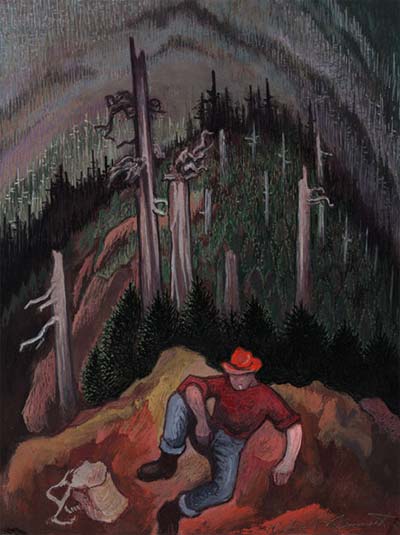
Richard Bennett. Untitled, ca. 1940s, tempera on paper. MOHAI, 2006.38.1
The Art of Richard Bennett. By David F. Martin. Seattle, WA : Museum of History & Industry: University of Washington Press, ©2010. 80p.
Recommendation by:
Rand Simmons, Acting Washington State Librarian, Tumwater, WA.
For those unfamiliar with Richard Bennett, Martin’s book gives a quick introduction to the artist’s life and contribution to Pacific Northwest art. The book was published in conjunction with an exhibition at the Museum of History & Industry in Seattle that ran August 28, 2010 to March 27, 2011.
The biography is easily read and tells the story of this painter, printmaker, author and illustrator who began his life in southern County Cork, Ireland, later hobnobbed with New York City artists, and became one of the nation’s leading illustrators of children’s book. He authored seven books including children’s books such as Skookum and Sandy (1935) and Shawneen and the Gander (1937). Bennett illustrated over 200 books, including several by bestselling and noted writers.
The Art of Richard Bennett includes 30 pages of plates of Bennett’s works. The section on publications and illustrations may be of interest to researchers. Sadly, the book is not indexed. Bennett was born in 1899 and died in 1971.
ISBN-13: 978-0939806072
Available at WSL, NW 760.092 MARTIN 2010
Not available as an eBook.
Not available in talking book or Braille editions.

November 30th, 2011 WSL NW & Special Collections Posted in Washington Reads Comments Off on “A most peculiar book”
 The Clear Cut Future. Edited by Clear Cut Press (Astoria, Oregon: Clear Cut Press, 2003. 528 p.)
The Clear Cut Future. Edited by Clear Cut Press (Astoria, Oregon: Clear Cut Press, 2003. 528 p.)
This is a most peculiar book, to misquote singer songwriter Paul Simon. First off, there’s its unusual size: 5 ¾ inches by 4 inches, and about an inch thick. Second, the contents. The book is a wild mélange of essays, criticism, short stories, excerpts from novels, poetry, photo essays, and the like by a variety of authors, whose only commonality appears to be that they are mostly from the Pacific Northwest, although that is never stated, and may not even be true. But many of the items contained in the book have NW settings, themes, or connections.
The quality of the various components arbitrarily concatenated here also varies wildly. The most entertaining and thought provoking include the title piece, which is a photo essay by Robert Adams, Corrina Wycoff’s short story “The Adjunct” and Pravin Jain’s essay “Capitalism Inside an Organization.” The latter provides an insightful glimpse into the workings of the Enron Corporation and some of its NW connections. “The Adjunct” describes the nightmarish existence of an instructor of first-year college writing courses who has to shuttle from campus to campus with never enough hours to complete her work, all to earn a barely subsistence-level “living.” The “Clear Cuts” photography consists of photos depicting exactly what the title says.
Also rich in NW verismo is Casey Sanchez’s “As Bad as It Comes, as Good as It Gets: Canning Salmon in Alaska,” which describes the social and economic phenomena, as well as the actual day to day rigors of traveling to the north country and working in a fish packing plant. The least readable, for me personally, were the academically absurdist writings of The Office for Soft Architecture.
If you are a fan of anything and everything NW, or if you like experimental writing and the good old fashioned avant-garde, you’ll definitely want to check out this book. Otherwise, you needn’t bother.
ISBN: 0-9723234-1-4
Available at the Washington State Library, NW 813.5408 CLEAR C 2003
Not available in eReader, Braille, or Audiobook editions

November 23rd, 2011 WSL NW & Special Collections Posted in For Libraries, For the Public, State Library Collections, Washington Reads Comments Off on New to NW Collection: Stone Projectile Points Of The Pacific Northwest
From the desk of Sean Lanksbury. PNW & Special Collections Librarian
When you visit the local history museums, do you find yourself wishing you knew more about those mysterious chipped points under the glass? Perhaps you are a collector, but are not entirely sure where or who certain parts of your collection came from. If so, then the State Library has added a new reference that will pique your interest.
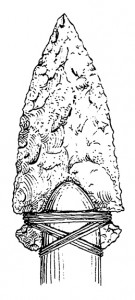 Stone Projectile Points Of The Pacific Northwest: An Arrowhead Collector’s Guide To Type Identification. By E. Scott Crawford (Carrollton, Tex.: Black Rock Publishing, ©2010. 130 p.)
Stone Projectile Points Of The Pacific Northwest: An Arrowhead Collector’s Guide To Type Identification. By E. Scott Crawford (Carrollton, Tex.: Black Rock Publishing, ©2010. 130 p.)
This work is the lifelong achievement of the author, an expert collector who began his journey in 1962. It identifies 62 different arrowhead, dart, and lance points, with full descriptions and illustrations to help you learn more about these historic indigenous hunting tools. It covers the geographic regions now occupied by the states of Washington, Oregon, Idaho, with northern portions of California and Nevada, and western portions of Montana and Wyoming.
This book contains an introduction to identifying points and a glossary of terms. It then proceeds to a discussion of the geographic features and the lithic (stone or rock) resources for each of the four Pacific Northwest regions named in the book. The chronological and temporal location of the point types are wonderfully illustrated in the following section, and then an entire section is dedicated to describing the manufacture of projectile points. The index of projectile points are organized by general shape, then by primary characteristics. This is an essential guide to both the hobbyist and the casual collector, and a fascinating read for those curious.
ISBN-10: 1453798471
Available at the Washington State Library, NW 979 CRAWFOR 2010
Available as an eReader edition.
Not available in Braille or Audiobook editions

November 16th, 2011 WSL NW & Special Collections Posted in Washington Reads Comments Off on New Gorton Biography from the Washington State Legacy Project
 Slade Gorton: A Half Century in Politics. By John C. Hughes. (Olympia, Wash.: Washington State Legacy Project, Washington Secretary of State, 2011)
Slade Gorton: A Half Century in Politics. By John C. Hughes. (Olympia, Wash.: Washington State Legacy Project, Washington Secretary of State, 2011)
As a state legislator, attorney general and U.S. senator, his 50-year career in public service put him on the front lines of a host of controversial issues—from redistricting to fishing rights disputes, the battle over the spotted owl and dam breaching. His service on the 9/11 Commission revealed his tenacity to find the truth. Often characterized as an icy intellectual, Gorton emerges as a complex, thoughtful man.
Read more at the Legacy Project’s Oral History site.
Some reviews have already started pouring in. Consider this one from John Dodge, Environment Reporter for The Olympian.
Available at the Washington State Library, NW 979.7043 HUGHES 2011
Available as a free eReader edition.
Not available in Braille or Audiobook editions.
November 2nd, 2011 WSL NW & Special Collections Posted in Washington Reads Comments Off on Criss-cross the Pacific Northwest with Charley and Lean on Pete.
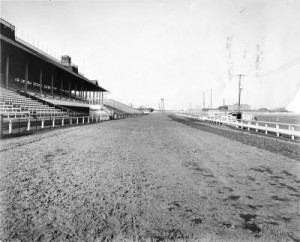 Lean on Pete. By Willy Vlautin. New York : Harper Perennial, c2010. 277 p.
Lean on Pete. By Willy Vlautin. New York : Harper Perennial, c2010. 277 p.
Vivid character development distinguishs this latest book from novelist Willy Vlautin. 15 year old Charley Thompson just wants the normal life of a teenager. He longs for the opportunity to play football and go to high school. When his father moves him from Spokane to Portland, he hopes for better luck than his down and out dad has had previously.
After Charley’s dad more or less abandons him, Charley lands a job working with horses at a nearby racetrack. There he develops a strong bond with a broken down racehorse with the improbable name of Lean on Pete. When Lean on Pete is threatened with destruction, Charley decides to save both of them.
He and Lean on Pete will travel to Charley’s only living relative in Wyoming. Individuals who appreciate a spare and intense writing style will find it in this book. As one critic puts it “Willy Vlautin plumbs the depths of despair but finally rewards you with redemption.”
ISBN-13: 9780061456534
Available at the Washington State Library, NW 813.6 VLAUTIN 2010
Available as an eReader edition.
Not available in Braille or Audiobook editions.

October 20th, 2011 WSL NW & Special Collections Posted in Washington Reads Comments Off on Cook in a good mood with the Wisdom of Elders.
 Wisdom of Elders: Traditional Food Ways of Five Tribes in Western Washington. Recipes collected and cookbook edited by Melissa E. Christy. (Phoenix, AZ : National Society for American Indian Elderly (NSAIE) ; Shelton, WA : South Puget Intertribal Planning Agency (SPIPA), 2008. 64 p.
Wisdom of Elders: Traditional Food Ways of Five Tribes in Western Washington. Recipes collected and cookbook edited by Melissa E. Christy. (Phoenix, AZ : National Society for American Indian Elderly (NSAIE) ; Shelton, WA : South Puget Intertribal Planning Agency (SPIPA), 2008. 64 p.
Recommendation by:
Rand Simmons, Acting Washington State Librarian, Tumwater, WA.
The delight of this small book is that it provides glimpses into the history, culture, and daily living of the people of five Western Washington tribes. Reflecting the wisdom of elders from the Skokomish Tribal Nation, Shoalwater Bay Indian Tribe, Squaxin Island Tribe, Confederate Tribes of the Chehalis Reservation and Nisqually Indian Tribe, this small book is chocked full of recipes, ancient and modern, photographs, and remembrances provided by tribal elders.
Readers can learn how people preserved and cooked food when there were no refrigerators, freezers, microwaves or electricity. Basic information on Lushootseed, the Puget Sound Salish language, at the back of the book includes examples of pronunciation and phrases. Sound advice can be gleaned: “Cook while you are in a good mood and love who you cook for” – Tschudub Indian Shaker Church belief. Many of the recipes can made using common pantry items: flour, sugar, baking powder eggs and oil. For other recipes, you may need assistance gathering kinnikinnick berries and salmon eggs or making tuddee from fern roots. But if you have a penchant for geoduck patties, this book will provide you with the recipe.
Colorful photographs help identify what ingredients and finish foods look like. Yes, this is a cookbook but it is so much more. This book is ideal for the cook who is collecting Pacific Northwest cookbooks, for librarians who are selecting materials on the Pacific Northwest, for school librarians who need basic information on Indians of the Pacific Northwest for their students’ curricular needs and for the generally curious reader. A joint project of the National Society for American Indian Elderly (NSAIE) and the South Puget Intertribal Planning Agency (SPIPA) Wisdom of the Elders was produced with funds granted by the Administration for Native Americans as part of its Knowledge Preservation Project. Melissa E. Christy collected the recipes, edited the cookbook, and contributed photographs.
For more information on this project and the NSAIE , visit http://nsaie.org/projects/the-wisdom-of-elders-cookbook/
Available at the Washington State Library, NW 641.5929 WISDOM 2008
Not available as an eBook, talking book, or as a Braille edition.

October 5th, 2011 WSL NW & Special Collections Posted in Washington Reads Comments Off on Another slice of supernatural delight set in the Tri-Cities region!
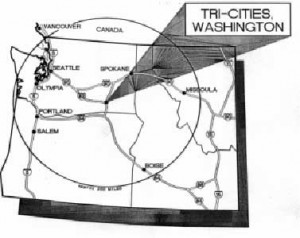 River Marked. By Patricia Briggs. New York : Ace Books, 2011. 324 p.
River Marked. By Patricia Briggs. New York : Ace Books, 2011. 324 p.
River Marked is Patricia Briggs’ 6th Mercy Thompson novel. Fans of this “kick ass supernatural heroine” will be very pleased with this latest entry to her story. As the chief mechanic and owner of a car repair business in Richland, WA, Mercy would be unusual. However it’s her attempt to live as a solitary coyote shape shifter among a complex society of werewolves, vampires, and fae (faeries) all the while not attracting the attention of normal folk that make her life challenging.
As this book opens Mercy & her new husband Adam, the Alpha werewolf of Richland, are camping on the shores of the Columbia River on their honeymoon as a result of a wedding gift of a gorgeous camping trailer from the fae. Fairy gifts always come with complications–and this time it’s a doozy of a river monster. Mercy needs to call on her Native American heritage to survive this struggle. While this book can be read alone, readers who don’t know Mercy would be better served to begin with Moon Called.
ISBN-13: 978-0441019731
Available at WSL, NW 813.6 BRIGGS 2011
Available as an eBook.
Not available in talking book or Braille editions.
Title contains adult themes.

September 7th, 2011 WSL NW & Special Collections Posted in Washington Reads Comments Off on Pelts help settle the New World.
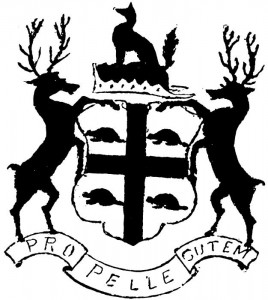 Fur, Fortune, and Empire: The Epic History of the Fur Trade in America. By Eric Jay Dolin. New York, N.Y. : W.W. Norton & Co., 2010. 442 p.
Fur, Fortune, and Empire: The Epic History of the Fur Trade in America. By Eric Jay Dolin. New York, N.Y. : W.W. Norton & Co., 2010. 442 p.
Recommendation submitted by Gordon Russ, Volunteer, Washington State Library, Tumwater, WA
Mr. Dolin takes us on a journey, following the fur trappers west as America grows in size and maturity. His story starts in the late 1500s with some of the early French explorers. The fur trade really gets going in the 1620s with the coming of the Dutch settlers and their need for income. They start a vigorous trade with the Native Americans for beaver pelts, much desired in Europe. The French and English quickly join the Dutch as they migrate to North America in search of new lands, religious freedom, and the need for income. They too find the need to trade for the highly valued furs in the virgin lands. The battle for Beaver pelts stirs much unrest between the home countries of these early settlers this leads to conflicts in Europe as well.
The fur trade moves west into the Great Lakes, up the Missouri river, into the Rocky Mountains, then down the Columbia River. Dolin takes us on an adventure: introducing us to the colorful people and characters of the of the fur trade such as Henry Hudson, John “Big Belly” Printz, John Jacob Astor, Christopher Hudson “Kit” Carson, Jim Bridger, Jedediah Smith, “Buffalo Bill” Cody and many others are introduced. The book becomes a good primer of American History. Dolin ties together those stories of our past and its people into a continuous thread of how we became who we are.
While the Beaver Fur trade and the genesis of America are percolating on the East Coast, the Spanish and Russians are not forgotten as they nibble away at the West coast in search of the Sea Otter. All parties come together for the final confrontation right here in the Pacific North West. As the battle for dominance of this new land rages, the participants drop out one at a time. First, the Spanish leave, then the Russians and French, which leaves only the British and Americans to confront each other on the new frontier for the furs. They discover they both have exhausted the Beaver, the Sea Otter and the reason they were there in the first place. This leaves the land to those who wanted it – the Native Americans and the Americans, but that is another story for another time.
So sit back and wrap yourself in your favorite buffalo robe and enjoy a good read of adventure and riches.
ISBN-13: 9780393067101
Available at WSL, NW 381.4568 DOLIN 2010
Available as an eBook.
Not available in talking book or Braille editions.

![By M Tullottes (Own work) [Public domain], via Wikimedia Commons](https://blogs.sos.wa.gov/library/wp-content/uploads/2012/02/256px-HandsInSoil.jpg) Edible Gardening for Washington and Oregon: Vegetables, Herbs, Fruits & Seeds. By Marianne Binetti. (Auburn, WA : Lone Pine Publishing International, 2010. 240 p.)
Edible Gardening for Washington and Oregon: Vegetables, Herbs, Fruits & Seeds. By Marianne Binetti. (Auburn, WA : Lone Pine Publishing International, 2010. 240 p.)











